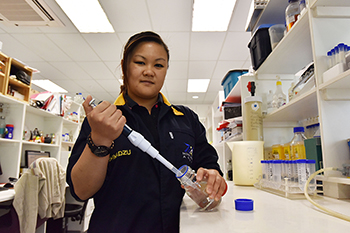Latest News Archive
Please select Category, Year, and then Month to display items
04 August 2020
|
Story Rulanzen Martin
|
Photo Supplied

Dr Nadine Lake, gender studies expert from the Centre for Gender and Africa Studies at the UFS, will participate in a streamed online Facebook discussion on ‘men and masculinities and finding ways of solving conflict and work towards healing the victims, the survivors, the perpetrators.’ This is the 13th episode of the #DigtallyYours discussion series initiated by the embassies of Sweden and the Kingdom of the Netherlands in SA, with support from the European Union in SA. The discussion will be moderated by renowned journalist, Redi Tlhabi.
Other panellists will include Mmatshilo Motsei, S’busiso Malope, Ruben Richards, and Xabiso Vili.
The impact of personal care products on water resources in the Free State
2015-12-14

Jou-an Chen
Photo: Charl Devenish
|
Water is of the utmost importance in personal hygiene. Most people can hardly have a day go by without taking a shower in the morning and at night. However, it is this very habit that is increasingly polluting the water resources in South Africa.
Contaminants found in pharmaceutical and personal care products have been accumulating in water masses in recent years. These contaminants especially refer to hormones in medication, as well as colouring agents and fragrances used in soap, shampoo and body lotions.
“Little information and data are available on the prevalence of these contaminants, and on how high the level of pollution really is,” says Jou-an Chen, researcher in the Department of Microbial, Biochemical and Food Biotechnology at the UFS.
Her research particularly focuses on the prevalence and impact of those contaminants.
“Because these substances have not been properly investigated, we are not sure how widely it occurs and whether it is harmful to the environment. It was precisely the lack of information that has inspired me to investigate further.”
“If we could identify the contaminants and what it is doing to the environment, it could make a valuable contribution to directives on water quality standards.”